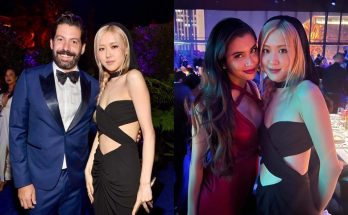Choosing to change your hairstyle can be an empowering experience, a way to express your personality and try something fresh. But sometimes, the reactions of those closest to us can bring unexpected surprises—or even hurtful remarks. In the case of one woman, her decision to embrace a short, pixie haircut was met with less-than-supportive feedback from her husband, who claimed she looked “awful, like a man.” This unfortunate reaction leads us to explore the complex relationship between hair, femininity, and societal expectations.
The Power of a Haircut: Why Women Cut Their Hair Short

Cutting one’s hair is often about more than just aesthetics. For many women, it’s a statement of independence and a way to regain control over their image. The decision to go for a bold new look, like a pixie cut, is usually driven by a desire for change, renewal, or even to leave behind a chapter of life. In this case, the woman was looking to shed negativity and embrace a look that made her feel refreshed and empowered. But why do others, particularly men, often react so strongly when women choose short hair?
Why Do Men React Negatively to Short Hair on Women?
Cultural norms and personal preferences both play a role in the way people react to haircuts. From a young age, we’re often conditioned to associate long hair with femininity and beauty. Storybook princesses, fairytale heroines, and Hollywood stars have all helped to cement the image of the “beautiful woman” with flowing locks. Men, consciously or not, may hold onto these ideals, and when faced with a departure from them, they can feel discomfort or even resentment.
Some men feel that women with short hair defy traditional expectations. Rather than viewing a short haircut as a form of self-expression, they may interpret it as a rejection of femininity. This can trigger a sense of insecurity or even lead them to question their own ideas about gender roles and attractiveness.
Personal Stories: When a Haircut Becomes a Point of Controversy
This woman’s experience is far from unique. Many women who choose to cut their hair short report similar reactions from men in their lives, from male family members and colleagues to friends and partners. After weeks of curating images and working up the courage, she took the plunge and cut her hair into a pixie. She loved the look and felt liberated, but her husband’s reaction dampened her excitement.
For others, the reactions have been equally harsh. One woman shared how her male friends questioned her choice, asking, “Why did you do it?” or outright stating that they preferred her with longer hair. Another young woman, after cutting her hair into a bob, was asked by her male colleagues if she had sought her boyfriend’s permission. These instances highlight how society’s attachment to hair length as a marker of femininity can impact the way women are treated.
Hair as a Marker of Gender Identity
Hair has long been a symbol of gender identity. In various cultures and historical periods, hair length has played a significant role in defining and categorizing individuals. Today, long hair is often still associated with femininity and youthfulness, while short hair, in many contexts, is linked with masculinity or nonconformity.
Anthropologists like Dr. Alexander Edmonds have noted that, over time, fashion has reinforced a distinct contrast between male and female presentation. For some men, a woman’s choice to cut her hair short can be perceived as an affront to traditional gender norms. Dr. Edmonds points out that short hair on women is often viewed as a rejection of the expectation that women should appear passive and eager to please. By cutting their hair, women may inadvertently challenge these norms, leading to reactions that are as much about discomfort with changing roles as they are about aesthetics.
The Double Bind of Hair Length for Women
Women are often caught in a double bind regarding hair length. On one hand, society’s beauty standards suggest that long hair is the epitome of femininity. On the other, professional settings often prefer women with shorter, more manageable hairstyles, such as bobs or shoulder-length cuts. Media often labels these styles with terms like the “power bob,” as seen with figures like Ivanka Trump, implying that short hair conveys professionalism and seriousness.

In the workplace, long hair might be seen as impractical or too “girly” to convey authority. A study by Dr. Mary Bock on broadcast journalists even found that short to medium-length hair seemed to be almost a uniform among female professionals, reinforcing the idea that hair length is more than just a matter of personal style. For women, hair length becomes a constant balancing act between meeting societal beauty ideals and conveying professional competence.
For Women of Color, Hair Expectations are Even More Complex
For women of color, especially Black women, the expectations surrounding hair can be particularly challenging. Long, flowing hair is often only achievable with expensive weaves, braids, or chemical straightening treatments. British-Nigerian Dolly Ogunrinde decided to shave her damaged hair and let it grow out naturally. She was shocked by the negative responses from others, including a boy who told her she looked “disgusting and like a boy.”
These comments reflect a deeper issue in which hair becomes a site of identity and expression, often policed by others. For many Black women, going natural or choosing a short hairstyle can feel like an act of defiance. It challenges both the cultural ideal of long hair and societal pressure to conform to Eurocentric beauty standards.
Redefining Femininity: Why Cutting Your Hair is Empowering

The choice to cut your hair short is about reclaiming control over how you present yourself. For the woman whose husband reacted negatively to her pixie cut, the decision was driven by a need to feel refreshed and empowered. While the hurtful comments may cause her to second-guess herself, it’s essential to remember that hair should be about personal expression, not appeasing others.
In a world where women are often expected to fit into narrow definitions of beauty, choosing a hairstyle that makes you feel confident is a powerful statement. When you cut your hair short, you’re not diminishing your femininity; you’re redefining it on your own terms.
A Message to Women: Embrace Your Hair Choices with Confidence
Every woman deserves the freedom to wear her hair however she chooses, whether that’s waist-length waves, a chic bob, or a daring pixie cut. The reactions of others—whether positive or negative—shouldn’t dictate your choices. Hair is a personal aspect of your identity, and choosing to make a change can be both exhilarating and liberating.
To the woman whose husband told her she looked “awful, like a man,” and to every woman facing similar comments, know that your hair is yours alone. Wear it with pride, and remember that confidence is the most beautiful accessory you can have. Embrace the transformation and stand by your decision. You are more than your hair, and you have the power to define what beauty means to you.
Conclusion: Don’t Let Others Define Your Beauty
The experience of cutting your hair and facing negative reactions is, unfortunately, a common one for many women. However, hair should be an expression of who you are, not who others think you should be. By choosing a look that makes you feel strong and happy, you’re embracing your authentic self.
In the end, beauty is subjective, and society’s standards are constantly shifting. Rather than conforming to what others expect, let your hair reflect your inner confidence and individuality. You may face criticism, but remember, the most important opinion is your own. Wear your hair however you like, and don’t give anyone the power to define your beauty.



